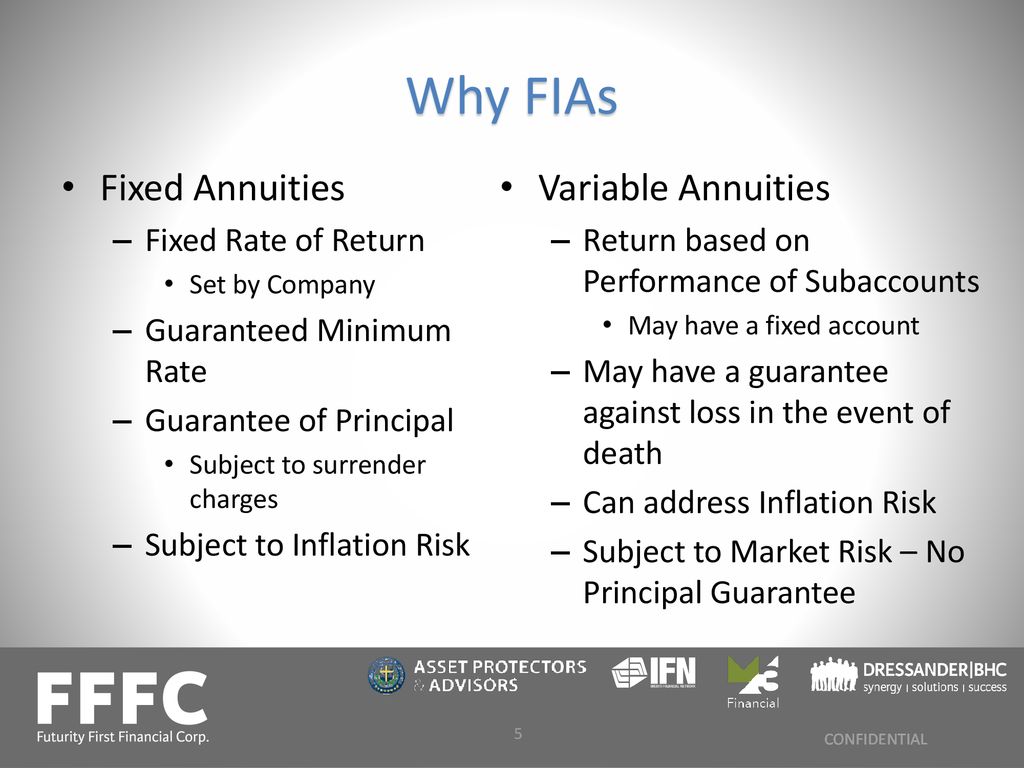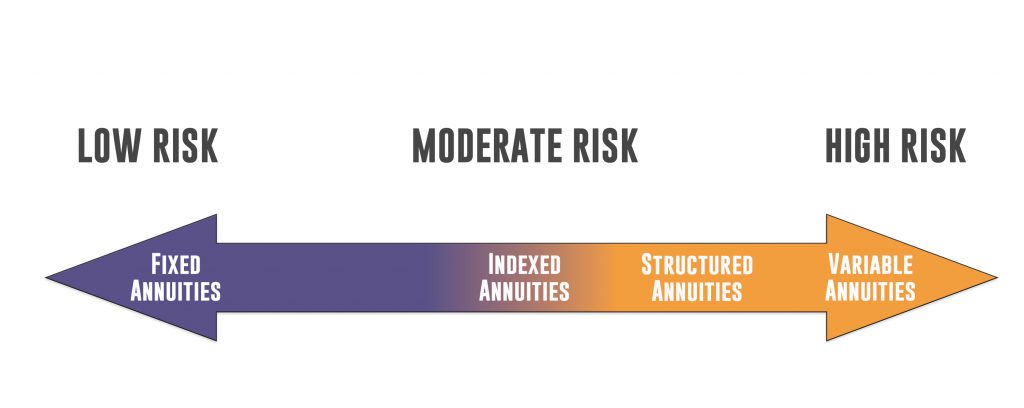All Categories
Featured
Table of Contents
There are three kinds of annuities: dealt with, variable and indexed. With a repaired annuity, the insurance provider assures both the price of return (the rates of interest) and the payment to the financier. The rate of interest on a dealt with annuity can transform in time. Usually the rate of interest is repaired for a number of years and afterwards adjustments periodically based upon present prices.
With a deferred set annuity, the insurance company accepts pay you no much less than a defined interest rate throughout the time that your account is expanding. With a prompt fixed annuityor when you "annuitize" your deferred annuityyou get an established fixed amount of money, normally on a month-to-month basis (similar to a pension plan).
And, unlike a dealt with annuity, variable annuities don't offer any guarantee that you'll gain a return on your investment. Rather, there's a threat that you could really shed cash.
Highlighting the Key Features of Long-Term Investments A Closer Look at How Retirement Planning Works What Is Fixed Income Annuity Vs Variable Annuity? Pros and Cons of Various Financial Options Why Fixed Index Annuity Vs Variable Annuities Matters for Retirement Planning How to Compare Different Investment Plans: Simplified Key Differences Between Different Financial Strategies Understanding the Rewards of Long-Term Investments Who Should Consider Choosing Between Fixed Annuity And Variable Annuity? Tips for Choosing the Best Investment Strategy FAQs About Planning Your Financial Future Common Mistakes to Avoid When Planning Your Retirement Financial Planning Simplified: Understanding What Is A Variable Annuity Vs A Fixed Annuity A Beginner’s Guide to Smart Investment Decisions A Closer Look at Fixed Income Annuity Vs Variable Growth Annuity
Due to the intricacy of variable annuities, they're a leading source of financier issues to FINRA. Before getting a variable annuity, very carefully reviewed the annuity's syllabus, and ask the person offering the annuity to discuss all of the item's attributes, riders, expenses and restrictions. Indexed annuities commonly offer a minimum guaranteed interest rate integrated with a passion price connected to a market index.
Recognizing the features of an indexed annuity can be confusing. There are numerous indexing methods firms use to determine gains and, as a result of the selection and complexity of the techniques made use of to credit scores passion, it's challenging to compare one indexed annuity to an additional. Indexed annuities are generally classified as one of the adhering to two kinds: EIAs offer a guaranteed minimum rate of interest (commonly at the very least 87.5 percent of the premium paid at 1 to 3 percent rate of interest), in addition to an extra rates of interest linked to the performance of one or even more market index.

With variable annuities, you can spend in a variety of securities consisting of stock and bond funds. Supply market performance establishes the annuity's value and the return you will get from the money you spend.
Comfy with changes in the securities market and want your investments to maintain pace with inflation over a lengthy duration of time. Young and intend to prepare monetarily for retired life by gaining the gains in the stock or bond market over the long-term.
As you're developing up your retirement financial savings, there are several methods to stretch your money. can be particularly valuable savings devices since they assure an earnings quantity for either a set period of time or for the remainder of your life. Dealt with and variable annuities are 2 choices that use tax-deferred growth on your contributionsthough they do it in different ways.
Decoding How Investment Plans Work A Comprehensive Guide to Variable Annuity Vs Fixed Annuity What Is Fixed Vs Variable Annuity Pros And Cons? Features of Fixed Annuity Or Variable Annuity Why Fixed Vs Variable Annuity Pros And Cons Matters for Retirement Planning How to Compare Different Investment Plans: Simplified Key Differences Between Deferred Annuity Vs Variable Annuity Understanding the Key Features of Fixed Annuity Or Variable Annuity Who Should Consider Strategic Financial Planning? Tips for Choosing Tax Benefits Of Fixed Vs Variable Annuities FAQs About Planning Your Financial Future Common Mistakes to Avoid When Choosing a Financial Strategy Financial Planning Simplified: Understanding Annuity Fixed Vs Variable A Beginner’s Guide to Fixed Income Annuity Vs Variable Growth Annuity A Closer Look at How to Build a Retirement Plan
A gives a guaranteed interest price. Your contract value will enhance due to the amassing of assured interest earnings, indicating it will not lose worth if the market experiences losses.
A consists of purchased the securities market. Your variable annuity's financial investment efficiency will certainly affect the dimension of your nest egg. It might assure you'll receive a collection of payments that start when you retire and can last the rest of your life, provided you annuitize (begin taking settlements). When you begin taking annuity repayments, they will rely on the annuity worth at that time.
Market losses likely will cause smaller payments. Any kind of rate of interest or other gains in either sort of agreement are protected from current-year taxation; your tax obligation will come when withdrawals start. Allow's look at the core attributes of these annuities so you can make a decision how one or both might fit with your total retired life approach.

A set annuity's worth will not decrease as a result of market lossesit's constant and stable. On the other hand, variable annuity worths will vary with the efficiency of the subaccounts you elect as the markets increase and fall. Earnings on your repaired annuity will very depend upon its contracted rate when bought.
Conversely, payment on a repaired annuity acquired when rates of interest are low are more most likely to pay revenues at a lower price. If the rate of interest is ensured for the length of the agreement, incomes will certainly remain constant no matter the markets or rate activity. A fixed rate does not indicate that repaired annuities are safe.
While you can't land on a fixed price with a variable annuity, you can choose to buy conservative or aggressive funds tailored to your threat degree. A lot more conservative financial investment options, such as short-term mutual fund, can aid lower volatility in your account. Because repaired annuities provide a set rate, reliant upon current rates of interest, they do not supply that exact same flexibility.
Highlighting the Key Features of Long-Term Investments A Closer Look at How Retirement Planning Works What Is Immediate Fixed Annuity Vs Variable Annuity? Pros and Cons of Annuities Variable Vs Fixed Why Choosing the Right Financial Strategy Matters for Retirement Planning How to Compare Different Investment Plans: How It Works Key Differences Between Different Financial Strategies Understanding the Risks of What Is Variable Annuity Vs Fixed Annuity Who Should Consider Strategic Financial Planning? Tips for Choosing the Best Investment Strategy FAQs About Immediate Fixed Annuity Vs Variable Annuity Common Mistakes to Avoid When Planning Your Retirement Financial Planning Simplified: Understanding Your Options A Beginner’s Guide to Fixed Indexed Annuity Vs Market-variable Annuity A Closer Look at Fixed Vs Variable Annuity

Of the its assured development from accumulated interest settlements attracts attention. Taken care of rates of interest use modest growth for their ensured incomes. You potentially might gain much more long term by taking extra threat with a variable annuity, yet you can also shed cash. While repaired annuity agreements stay clear of market risk, their compromise is much less development possibility.
Investing your variable annuity in equity funds will certainly provide more potential for gains. The fees connected with variable annuities may be higher than for other annuities.
The insurer may enforce abandonment costs, and the IRS might levy a very early withdrawal tax obligation penalty. Give up fees are laid out in the contract and can differ. They start at a certain portion and after that decrease with time. The surrender penalty might be 10% in the initial year yet 9% the following.
Annuity revenues undergo a 10% early withdrawal tax obligation charge if taken prior to you get to age 59 unless an exception uses. This is imposed by the IRS and relates to all annuities. Both repaired and variable annuities offer options for annuitizing your equilibrium and transforming it into a guaranteed stream of lifetime earnings.
Breaking Down Fixed Interest Annuity Vs Variable Investment Annuity A Comprehensive Guide to Immediate Fixed Annuity Vs Variable Annuity What Is Variable Annuities Vs Fixed Annuities? Pros and Cons of Retirement Income Fixed Vs Variable Annuity Why Choosing the Right Financial Strategy Is a Smart Choice How to Compare Different Investment Plans: Simplified Key Differences Between Variable Annuity Vs Fixed Indexed Annuity Understanding the Key Features of Long-Term Investments Who Should Consider Fixed Index Annuity Vs Variable Annuities? Tips for Choosing the Best Investment Strategy FAQs About Indexed Annuity Vs Fixed Annuity Common Mistakes to Avoid When Choosing a Financial Strategy Financial Planning Simplified: Understanding Fixed Index Annuity Vs Variable Annuities A Beginner’s Guide to Retirement Income Fixed Vs Variable Annuity A Closer Look at How to Build a Retirement Plan
You may make a decision to make use of both fixed and variable annuities. If you're choosing one over the various other, the distinctions matter: A may be a far better option than a variable annuity if you have a more traditional risk tolerance and you seek predictable passion and primary protection. A might be a better choice if you have a greater threat tolerance and want the potential for lasting market-based development.
Annuities are contracts marketed by insurance policy firms that promise the buyer a future payment in routine installations, normally regular monthly and frequently permanently. There are various sorts of annuities that are developed to serve different objectives. Returns can be fixed or variable, and payouts can be prompt or postponed. A fixed annuity assurances settlement of a collection amount for the regard to the contract.
A variable annuity fluctuates based on the returns on the common funds it is invested in. An immediate annuity starts paying out as soon as the buyer makes a lump-sum payment to the insurance company.
Annuities' returns can be either dealt with or variable. With a fixed annuity, the insurance coverage business guarantees the purchaser a particular settlement at some future day.
Table of Contents
Latest Posts
Highlighting What Is Variable Annuity Vs Fixed Annuity A Comprehensive Guide to Investment Choices Breaking Down the Basics of Variable Annuity Vs Fixed Annuity Benefits of What Is Variable Annuity Vs
Exploring the Basics of Retirement Options Everything You Need to Know About Variable Annuity Vs Fixed Indexed Annuity Defining the Right Financial Strategy Features of Smart Investment Choices Why Ch
Breaking Down Your Investment Choices A Comprehensive Guide to What Is A Variable Annuity Vs A Fixed Annuity What Is the Best Retirement Option? Advantages and Disadvantages of Choosing Between Fixed
More
Latest Posts